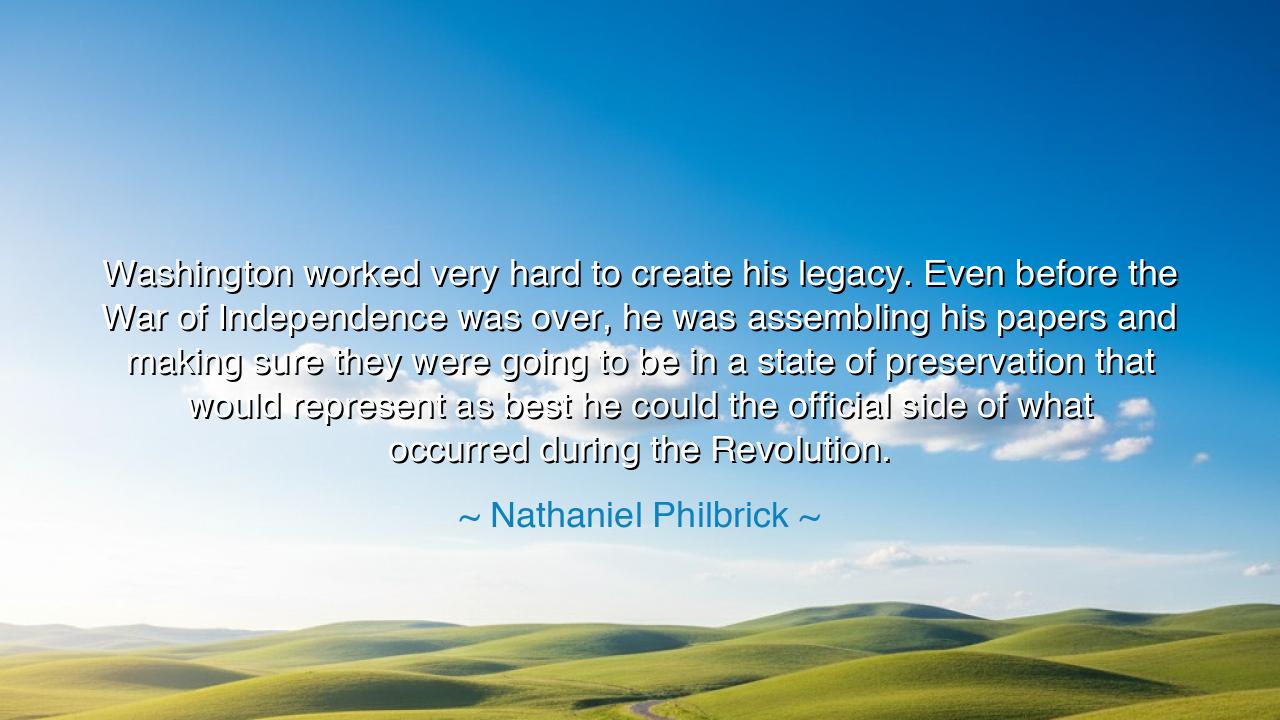
Washington worked very hard to create his legacy. Even before the
Washington worked very hard to create his legacy. Even before the War of Independence was over, he was assembling his papers and making sure they were going to be in a state of preservation that would represent as best he could the official side of what occurred during the Revolution.






Hear now the words of Nathaniel Philbrick, the historian who peers into the heart of America’s birth: “Washington worked very hard to create his legacy. Even before the War of Independence was over, he was assembling his papers and making sure they were going to be in a state of preservation that would represent as best he could the official side of what occurred during the Revolution.” These words, though calm in tone, reveal the mind of a man who understood the weight of eternity — for in George Washington, we see not only a general or a president, but a craftsman of memory, one who built his immortality not through conquest, but through conscious preservation.
The origin of this insight lies in the study of Washington’s own hand — his letters, journals, and meticulous records, written amidst the smoke of battle and the toil of governance. Washington knew that history was not written by chance, but by those who took care to leave their truth behind. Even before victory at Yorktown, as his soldiers shivered at Valley Forge and the dream of liberty hung by a thread, he began collecting correspondence, orders, and reports. To him, the struggle for independence was not only to free a people in his time, but to shape how that freedom would be remembered for all time. He labored not merely for victory, but for the story of that victory — for he knew that nations, like men, live and die by the power of their legacy.
In this, Washington revealed a wisdom known to the ancients. For the Greeks, kleos — the glory of one’s name — was as precious as life itself. Heroes like Achilles sought not longevity, but remembrance; not comfort, but the immortality of being sung by poets. Washington, too, was a man of such vision, though his heroism was tempered by humility. He sought not songs of himself, but a faithful record of his deeds. He understood that truth, once forgotten or distorted, can turn even the noblest revolution into myth or madness. Thus, in preserving his papers, he was preserving the soul of a nation still being born — ensuring that the ideals of liberty and sacrifice would not be buried beneath the dust of time.
Consider, too, how rare such foresight is. Many leaders, consumed by war or power, think only of the moment. They fight their battles, make their speeches, and leave the rest to the whims of fate. But Washington, ever disciplined, saw beyond the horizon. Like a careful builder laying stones for a temple he would never see completed, he gathered the materials of memory — not for his own vanity, but for the education of posterity. He wanted the world to know not only what had been done, but why — that freedom is never born of chance, but of perseverance, sacrifice, and moral strength.
In doing this, he joined the ranks of the philosopher-kings and wise rulers of history. Like Marcus Aurelius, who wrote his meditations not for glory but for the guidance of those to come, Washington shaped his legacy to serve as a mirror for future generations. He understood that character is not what one claims, but what one leaves behind. His letters, filled with restraint, duty, and moral reflection, reveal the inner architecture of his soul — a man who sought to embody virtue not as an ornament, but as the cornerstone of leadership.
Philbrick’s observation reminds us, too, that legacy is a labor. It does not emerge by accident or survive by neglect. It must be built, tended, and guarded. Washington’s careful preservation of his words stands as a challenge to all who live in the fleeting age of impulse and noise. If even a man of his greatness worked tirelessly to preserve truth, how much more must we strive to ensure that our deeds, our principles, and our stories are remembered with integrity?
Thus, the lesson shines clear as the morning after battle: every life is a record in the making. Each of us, whether soldier or scholar, leaves behind a trail of words and actions that will speak long after we are gone. To live, then, as Washington lived, is to live with intention — to act not only for the moment, but for the memory. Let your words be honest, your deeds steadfast, and your conscience your historian. For the world forgets quickly, but character, once written in the ink of truth, endures like stone.
So, my children, remember this: do not wait for others to tell your story. Build it yourself, as Washington did — with diligence, humility, and the unwavering desire to serve a cause greater than self. For those who live for virtue, history itself becomes their ally, and their names, like his, are carried forward by the timeless winds of honor and remembrance.






AAdministratorAdministrator
Welcome, honored guests. Please leave a comment, we will respond soon